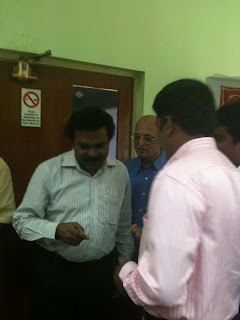On August 6th 2011, Privacy India in partnership with Citizen Consumer and Civic Action Group(CAG), Madras Institute for Development (MIDS), and IDRC, held “Privacy Matters Chennai” a public conference that provided a platform for a variety of discussions and perspectives on the topic of privacy in India.
The conference looked at the tensions between privacy and society with a specific focus on consumer privacy and privacy of telecommunications. Privacy India is a virtual entity that was established through the collaboration of Center for Internet and Society, an NGO based in Bangalore, and Society in Action Group, an NGO based in Delhi.
Speaking in the keynote session was Dr. Santosh Babu, Sashi Kumar Menon, and R. Ramamurthy. Dr. Santosh Babu, the Secretary of IT for the Tamil Nadu Government shared his personal experiences with e-governance projects and privacy. He explained how e-governance projects, such as electronic grievance systems, can bring great benefits to all classes in society, they can also pose a risk to privacy, because they depend on the collection of information and formation of databases. Therefore, the pros and cons of every project developed must be weighed with privacy and impact in mind. Sashi Kumar
In the first session, Usha Ramanathan, advocate and social activist and Mrs. Desikan, Consumer Association of India, spoke on privacy and telecommunications. Mrs. Ramanathan pointed out that telecommunications are just one way in which the State is collecting information about individuals. New initiatives such as the UID and other e-governance projects also work to build databases and collect information about individuals. This collection of information is a threat to individual privacy as people lose the ability to control who has access to their information, what that information says about them, and how that information is used. Mrs. Ramanathan also spoke about the new draft Privacy Bill, pointing out that we should look at what the Privacy Bill is protecting in terms of privacy, but also what the Bill is accepting as areas that need privacy protection. Mrs. Desikan spoke predominately about consumers rights in concern with telecommunications and telemarketers. Members of the audience voiced their discontent over the telemarketing calls that they receive multiple times a day. Mrs. Desikan responded to these complaints by pointing out that though TRAI can do a better job of enforcing regulations and bringing redress for violations, it is also the responsibility of the consumer to know the contracts that they are signing and the products that they are purchasing.
Also speaking in this session was Mr. S. Martin, Advocate and Consumer Activist. Mr. S Martin spoke on financial transactions and privacy. He argued that n individuals financial information should be held to the highest level of privacy, unless the information involves public money. In his presentation Mr. Martin emphasized to the udience the importance of disclosing financial information only when consent has been given.
In the second session Dr Revathi, Associate Professor at the Dr. Ambedkar Law University in Chennai, looked at consumer privacy from a legal perspective. Noting that as consumers we are always exchanging personally identifiable information, and thus our privacy is always at risk, she talked about how consumer privacy is mainly concerned with how ones information is collected, what information is collected, and how that information is used. Her presentation highlighted different regimes and bodies that protect privacy in India such as the RBI, and discussed different obligations that corporates have in India to protect consumers privacy.
The last session focused on Privacy and Basic Rights/Needs. Dr. N Manimekalai , head of the gender studies department at the Bharathidasan University in Trychy, spoke on how protecting human rights of individuals can also work to protect their privacy. Her presentation highlighted how the lives of the underprivileged are concerned with privacy in many ways including: the right to sanitation, the right to shelter, the right to familial privacy, labor rights in the work place bodily integrity, the right to public space, and the right to clothing. Dr. N Manimekalai also spoke about how women face specific challenges to privacy such as lack of proper public restrooms and lack of privacy over personal choices concerning her body.
Speaking on privacy, natural resources, and the UID was Mr. Ramkumar. Mr. Kumar pointed out that when talking about natural resources - rights and entitlements are very important. What the UID seeks to do is to deny those who are not in the UID system entitlements, because you do not have the accepted identity. He also brought out the point that the UID will work to take away the informal sector in India, but the impact of this must be considered as currently, India is largely comprised of the informal sector.
Many themes relating to privacy were brought out over the course of the day. On one note the audience discussed different consumer violations they had experienced, and noted that consumers need to be aware of what information that is being collected, how that information is being used, and what are the forms of redress on can take if the information is abused. Over-collection of information by the Government was another theme. Members of the audience voiced concerns about the amount of information the Government is collecting through different schemes, and the way in which this will change the relationship between the State and the citizen. The need to protect the privacy of the underprivileged as a basic human right emerged as another theme.
“Privacy Matters Chennai' is the fifth of eight public consultations that Privacy India will be holding across the country. Please visit www.privacyindia.org for more information on upcoming events.
Thank you
Elonnai Hickok
Centre for Internet & Society
Bangalore India


